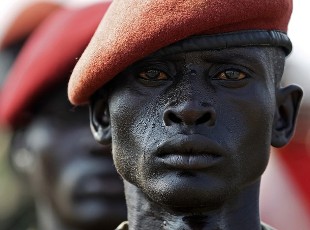S. Sudan army jails high ranking officers over rights abuses in Jonglei
August 22, 2013 (JUBA) – A dozen high ranking officers in the Sudan People’s Liberation Army (SPLA) have been jailed over the role troops under their direct command played in the alleged killing of innocent civilians in Jonglei state, a military spokesperson said.

Brigadier General James Otong is one of the top military officers currently behind bars in response to charges brought against units he commanded while deployed in Pibor county.
There has been mounting domestic and international pressure on both state and central government to take corrective actions after allegations surfaced that the army had been involved in rights abuses in the state.
SPLA spokesman Col. Phillip Aguer said pressure on the government had compelled president Salva Kiir Mayardit to take action.
As head of state, Kirr by virtue becomes the army’s commander-in-chief of the army and the supreme commander of other organised forces who were in the areas where alleged crimes were committed.
“The purpose of the arrests is to promote justice and assist in maintaining good order and discipline in the armed forces, as well as promoting efficiency and effectiveness in the military and strengthen national security:, Aguer said in a statement read on South Sudan Television (SSTV).
It is alleged commanders lost control of their troops, or were unwilling to impose discipline over their men during a military operation to disarm the civilian population in Jonglei’s eastern region, leading to the killing of more than 100, 000 civilians, grave human rights abuses and displacements.
“It is always difficult to carry out an investigation at a time of conflict and to know what units committed the crimes, said Aguer, adding that the army had set up a special undercover team to investigate the allegations.
“It was difficult to find proof. We know that some reports have been released, but who exactly did that was hard to find out”, he said.
Suspects and victims will be interviewed by military prosecutors before the trial. South Sudan has a track record of letting crimes of human right abuse go unpunished, particularly when the military is involved.
The culture of impunity pervades all levels of society and has created an environment prone to human rights abuses because perpetrators do not fear being prosecuted.
Activists and the United Nations Mission in South Sudan (UNMISS) have repeatedly released reports detailing the killing of members of the Murle ethnic group, while soldiers have also been accused of carrying out rape, a war crime under international law.
MILITARY INVESTIGATION PROCEDURES
The military officer said reporting and investigating crimes in the military differs from civilian communities.
“In the army, crimes committed by soldiers go through the chain of command up to the president, delaying immediate action being taken against the perpetuators. Under the direction of the president, military commanders are responsible for maintaining law and order in the communities over which they have authority, and for maintaining the discipline of the fighting force”, a senior military source on told Sudan Tribune Thursday.
“Reports about crimes by soldiers in active service ultimately goes to their commanders who will subsequently form [an] investigative committee before reaching out to the president with recommendations”, he added.
The official described the Jonglei situation as particularly complex, saying commanders may need specialised investigative assistance from military criminal investigative experts to study the cases.
“When the commander finishes the preliminary inquiry, he must make a decision on how to resolve the case. Unlike civilian communities, where a chief or local judge decides whether or not to initiate charges, in the military, commanders make that decision”, he said.
“The commander could decide that no action at all is warranted or he could take administrative action, such as an admonition or reprimand, or making an adverse comment in performance evaluations, or seeking discharge of the member from the service. The commander also possesses non judicial punishment authority and may also determine that criminal charges are appropriate”, he added.
(ST)
